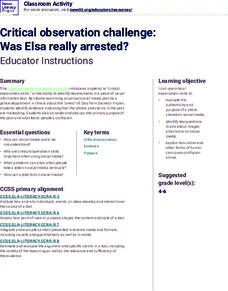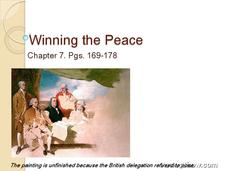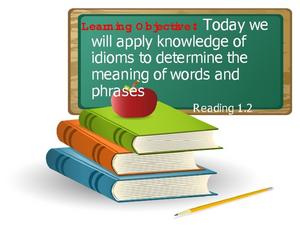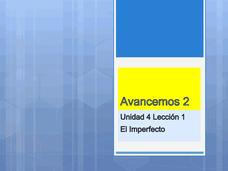Scholastic
Study Jams! The Respiratory System
Inhale, exhale, and rest easy when looking for a supportive tool for your activity on the respiratory system. Seven slides introduce the class to the function of the organs: lungs trachea, diaphragm, bronchial tubes, bronchioles, and...
Scholastic
Study Jams! Soil
Seven superb slides sharpen science students' scoop on soil. In viewing them and reading the accompanying captions, your class will uncover the importance, different types, horizons, and protection of soil. They can then assess their new...
Scholastic
Study Jams! The Ocean Floor
Under the sea, the geography is as varied as it is on land! Young oceanographers find out about continental shelves, abyssal plains, seamounts, trenches, and mid-ocean ridges by viewing and reading the eight high-quality slides. Then...
National Park Service
Erosion
A set of PowerPoint slides supports a lecture or class review of weathering and erosion. Viewers learn the definition of each and examine various photos for evidence. Erosion is further depicted as caused by wind, water, and ice....
Positively Autism
"Saying 'No, Thank You'" Social Skills Story
Teach learners to use polite words when they do not want something, rather than being rude or aggressive, using these simple presentation slides. The presentation walks students step by step through what it means to say "No, thank you,"...
Health Smart Virginia
How Are You Feeling Today?
A presentation guides a thoughtful discussion about identifying emotions. Slide-by-slide, scholars answer questions and offer details about specific feelings. A worksheet challenges class members to draw facial expressions and describe...
News Literacy Project
Critical Observation Challenge: Was Elsa Really Arrested?
A 14-slide presentation showcases a social media post featuring Disney's Elsa from the movie, Frozen. The seemingly harmless post received lots of attention, raising the question, how do we know posts are factual? Scholars go through...
Teach Engineering
Physics Tug of War
Slide books with a little assistance from Newton. Using books, groups create a demonstration of Newton's Second Law of motion. Pupils compare the distance traveled by one and two books when they apply a force to them.
Curated OER
The Slant on Slides Lab
In this inclined planes activity, students investigate the effort force needed to move a 1 kg weight up a ramp to different distances on the ramp. Students calculate the work input and output for each trial as well as the efficiency of...
Science Geek
pH Calculations
Performing calculations is for more than just mathematicians — it's an important science skill, too. Demonstrate the pH calculations using the slide show resource. The final resource of a seven-part unit introduces young scientists to...
Curated OER
Synonyms - How Authors Make Comparisons
A very good 13-slide presentation on similes and metaphors is here for you. It introduces young poets to each term, gives examples, and prompts them to work together to identify similes and metaphors in several different sentences.
Power Show
Winning the Peace
There is a price for peace. The information and images contained in this 19-slide presentation illustrate the compromises necessary and the costs to those who backed the losing side in the battle for American independence.
Curated OER
Knowledge of Idioms
What is an idiom, and why is it necessary that we know and understand them? This brief PowerPoint helps answer these questions by looking at examples and offering a strategy for reading new text that might contain an idiom. The final...
National Research Center for Career and Technical Education
Transportation, Distribution, and Logistics: Tire and Wheel Assemblies
Is bigger really better? By the end of this lesson, learners will be able to apply formulas for computing the diameter of tires and wheel assemblies. Begin by showing a slide presentation that will review definitions for radius and...
Curated OER
Madame Marie Curie & The Science of Radioactivity
A student-created, yet comprehensive 37-slide presentation on the life and contributions of Marie Curie awaits your upcoming chemists! With plenty of photographs, this resource introduces the woman who is responsible for our early...
Scholastic
Study Jams! Renewable Fuels
A single slide introduces each of the following renewable energy sources: hydroelectric, wind, geothermal, solar, tidal, and biomass. This provides a succinct overview that you can use as a visual aid when you first introduce alternative...
Baylor College
How Do We Use Water?
Send youngsters home to survey how they use water in their homes. Then bring them together to discuss which uses are essential for our health and which are not. A helpful video offers teaching tips for this lesson, and a presentation...
Baylor College
Gases Matter
As a demonstration or as a hands-on activity, your class watches as the combination of vinegar and baking soda produce carbon dioxide gas. The intent of the lesson is to help youngsters understand that gases occupy space. It is included...
Scholastic
Study Jams! Natural Resources
Use this slide show to introduce your class to some of our most useful natural resources. The text beneath the photographs differentiates between renewable and non-renewable resources. The need for conservation of resources and human...
Scholastic
Study Jams! Fossil Fuels
Eight slides introduce viewers to the wonders and woes of fossil fuels. How are they formed? How do we use them? How do they harm the environment? And how can we conserve? All of these thoughts are briefly touched upon. In addition to...
Scholastic
Study Jams! The Immune System
A set of slides depicts sick children, an artistic rendition of a white blood cell amongst red blood cells, and a diagram of part of the lymph system to teach youngsters about immunity. Kids will find that it is made up of skin, white...
Scholastic
Study Jams! Seasons
Use this during the season of teaching about the seasons! As Earth revolves around the sun, its tilt causes the weather to change. The graphics in this presentation show how Earth's position in space has an effect on the angle of...
Curated OER
How to Identify Figurative Language
Reinforce understanding of five literary terms with a single-slide flow chart. Learners figure out if various words and phrases are examples of simile, metaphor, hyperbole, understatement, or personification.
Curated OER
El Imperfecto
You class can learn all about how to form the imperfect with -ar and -er/-ir verbs. The slides do cover the only verbs that are irregular in the tense and the situations for which you use the imperfect (plus examples). Go over the...
Other popular searches
- Lenses & Slides
- Slides Flips Turns
- Flips Slides and Turns
- Digital Slideshow
- Geometry Slides Flips Turns
- Creating a Slideshow
- Animal Slideshow
- Slides, Flips, Turns
- Geometry of Slides
- Slideshow Presentation


















